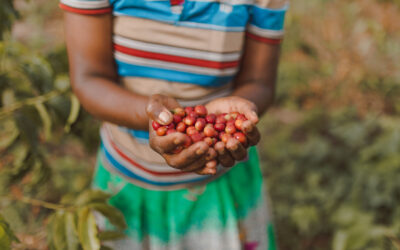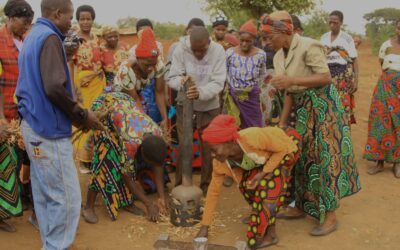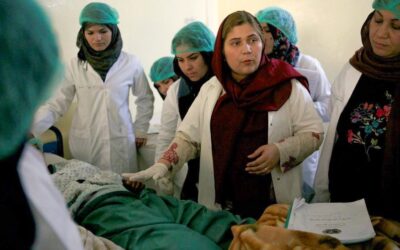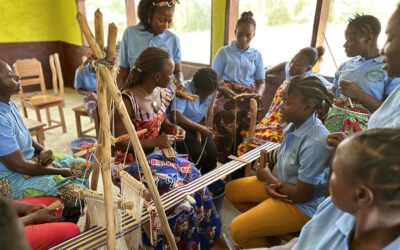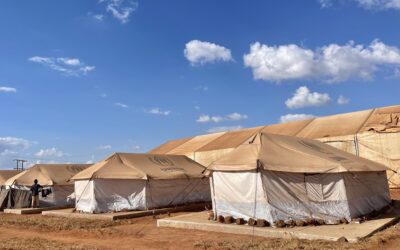Best Practices for Preventing Human Trafficking
Human trafficking is defined as the recruitment, transport, transfer, harboring, and receiving of people, typically by force or coercion, for the purpose of exploitation. Trafficking can take many forms. One of ODW’s partners, Next Generation Nepal (NGN), stops trafficking before it starts by raising awareness about the manipulative tactics used by traffickers. Today, we’re learning from NGN Program Director, Rupa Sitaula, about recommended practices for educating rural communities about trafficking:
***
Despite the efforts of the Nepal government and non-governmental organizations to combat trafficking within the country, various forms of human trafficking still exist. Orphanage trafficking, being one, is a form of trafficking in which children are removed from their families, often under false promises, and transferred or recruited into orphanage care where they often face various forms of exploitation for profit. Therefore, educating communities about human trafficking is essential.
Proven methods used by Next Generation Nepal to educate communities on trafficking:
Community Awareness through Street Dramas:
Street drama performances, one of the most effective methods, paint a visual story for people, and create a lasting impact on communities. Our team of skilled actors, led by the field officer, travel to remote villages to educate vulnerable communities on trafficking dangers. Street drama scripts are designed to engage and entertain audiences while highlighting the dangers of trafficking and emphasizing the importance of family-based care. Street dramas also give them an opportunity to share their opinions about trafficking within their community.
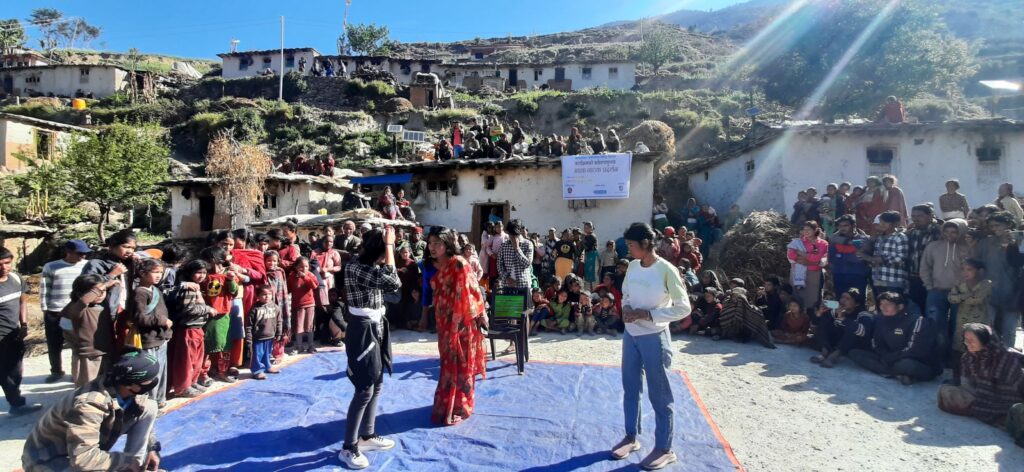
Next Generation Nepal hosts a drama about the dangers of trafficking in a rural part of Kalikot District (2023).
Radio Jingles for Mass Outreach:
To reach remote areas where access to other forms of media is limited, NGN collaborates with local radio stations to create jingles that convey messages on raising awareness, preventing child trafficking, and promoting family-based care.
Sensitization Meetings with Child Clubs and Women Groups:
NGN acknowledges that empowering children is vital to preventing trafficking. In addition, NGN believes that women play a major role in safeguarding their families and communities from trafficking. Therefore, through these meetings, NGN encourages children to report suspicious cases to the police and local child helplines, educates them on trafficking dangers, and helps them understand their rights. Also, they educate women about the warning signs of trafficking, current legal provisions, and the importance of reporting suspicious activities.
Sensitization Meetings with School Management committee and teachers:
School management committees and teachers can prevent and stop trafficking cases in various ways, including monitoring absenteeism. NGN works closely with teachers and school management to identify children at risk and address potential trafficking situations. Also, NGN works to integrate anti-trafficking messages into curriculum and activities.
Interaction Meetings with Local Government Representatives:
NGN conducts meetings with local governments, leaders, and activists to address issues of trafficking and encourage active participation as they have vital roles in their respective communities. NGN also collaborates with local government representatives to advocate for policy reforms and resource allocation towards anti-trafficking efforts.
Sensitization Meetings with Transportation Management Committees:
Transportation systems often unknowingly support trafficking because children are trafficked from one place to another using various forms of public transportation. NGN collaborates with transportation management committees, drivers, and conductors on trafficking indicators and prevention strategies. Through these meetings and training sessions, transportation personnel are trained in identifying and reporting cases of human trafficking.
***
Want to learn about how One Day’s Wages supports global efforts to prevent trafficker and support survivors? Read more and join us in the fight against human trafficking!
More stories of impact
When Generosity Sounds Like a Song: An Invitation to Create Together
At One Day’s Wages, we are endlessly inspired by what happens when people bring their full selves—their creativity, curiosity, and courage—into a shared mission. Our work to alleviate extreme poverty has always been built on partnership. Not just with grassroots...
Ways to Give: Simple, Meaningful Options That Fit Your Life
Generosity isn’t one-size-fits-all. At One Day’s Wages, we believe giving should feel accessible, thoughtful, and aligned with your real life—whether you’re just starting out, raising a family, building a business, or planning your legacy. Here are several ways our...
Starting With Strengths: How Asset-Based Development Can Transform Communities
When people talk about community development, the conversation often begins by listing what’s missing: clean water, farming knowledge, health clinics, and more. And while understanding needs is important, defining communities by their needs can paint them as passive,...
One Day’s Wages Named Together Women Rise 2026 Featured Grantee for Maternal Health Work in Afghanistan
One Day’s Wages (ODW) is honored to announce its selection as the 2026 Featured Grantee of Together Women Rise, a powerful global community of women and allies committed to advancing gender equality. This prestigious award includes a $50,000 grant over two years...
Women at Work: Toward Inclusion in the Global Workforce
Can you remember the last time you couldn’t make it to work? Maybe your nanny canceled, and you were left without childcare. Or maybe your car battery died, and you didn’t have a safe way to get to the office. These are the kinds of barriers that women around the...
Standing in Solidarity When the World Turns Away
We cannot fix every broken system. But we can choose to stand in solidarity with those who cross our path. This choice, this posture of care and action, is what fuels us at One Day’s Wages. And it’s why we need each other, now more than ever. Recently, our Global...
LEARN
Leadership
Transparency
Read the Latest
Contact Us
COLLABORATE
Faith Groups
Schools
Businesses
Get Involved
One Day’s Wages exists to alleviate extreme poverty by investing in, amplifying, and coming alongside locally led organizations in underserved communities.
©2026 One Day's Wages is a registered 501(c)(3) organization | Tax ID #26-2566653 | Privacy policy | Terms of use
P.O. BOX 17575 Seattle, WA 98127 | Contact us


